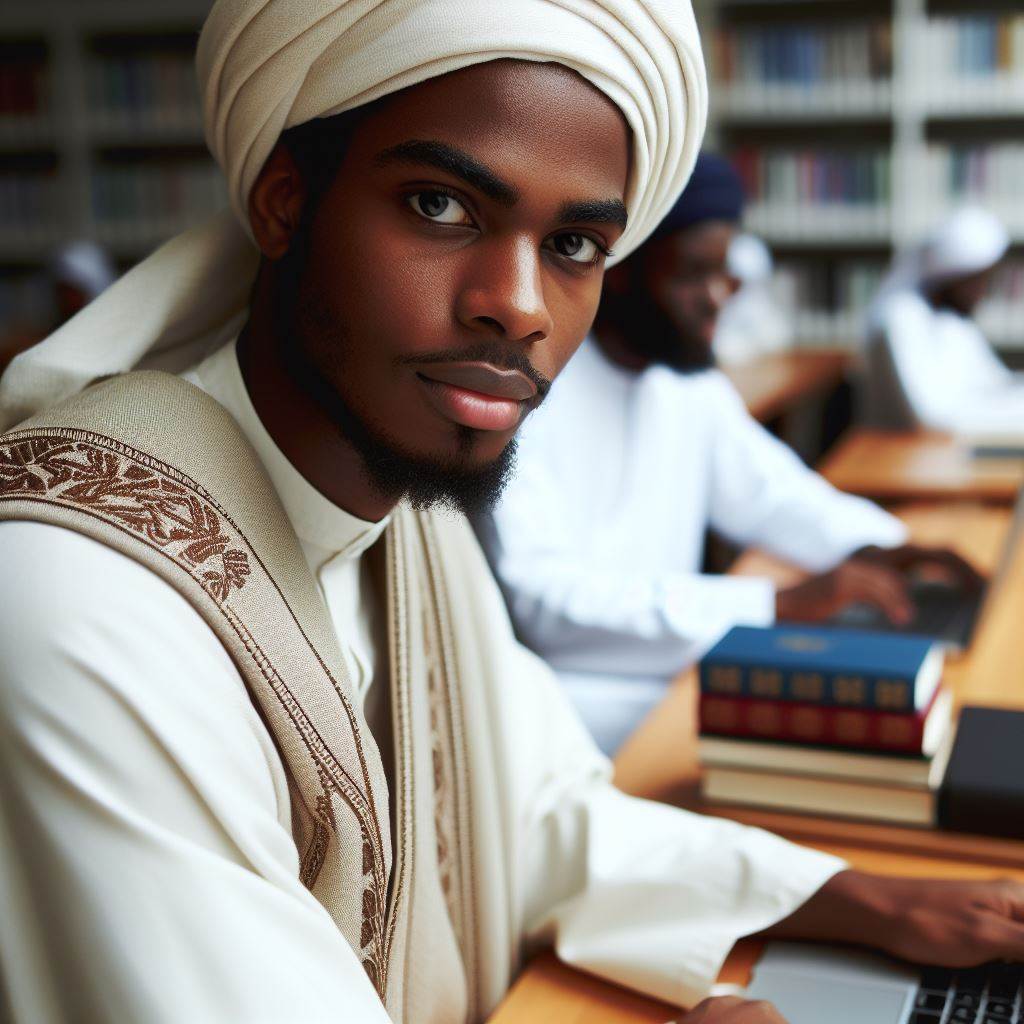Introduction
Arabic Studies in Nigerian universities play a vital role in the country’s educational landscape.
Arabic, as a language, holds significant importance for Nigeria.
It is not only a language of communication but also a language of religion and culture.
In the Nigerian education system, Arabic serves as a bridge between different cultures and civilizations.
The study of Arabic provides students with valuable linguistic and cultural insights.
Additionally, it enhances their understanding of historical and contemporary issues in the Arab world.
Arabic Studies curriculum in Nigerian universities aims to equip students with language proficiency, cultural awareness, and critical thinking skills.
In fact, Arabic Studies contribute to fostering multiculturalism, promoting intercultural dialogue, and enriching the educational experience in Nigerian universities.
History of Arabic Studies in Nigeria
Arabic studies in Nigeria have a long and rich history that dates back centuries. It all began with the introduction of Islam to the region through trans-Saharan trade routes, which brought Arabic language and Islamic education to Nigerian society.
Historical Background of Arabic Studies in Nigeria
The historical background of Arabic studies in Nigeria is closely tied to the spread of Islam in the region.
Arabic was initially used as a language of religion and culture among the early Muslim communities in Nigeria.
Over time, as Islam took root in the region, Arabic language and Islamic education became essential components of the Nigerian educational system.
Evolution of Arabic Studies in Nigerian Universities
The evolution of Arabic studies in Nigerian universities can be traced to the establishment of the first Arabic schools in the country during the colonial era.
These schools were primarily focused on teaching Arabic language and Islamic studies to students who were interested in pursuing careers in religious fields.
With the independence of Nigeria in 1960, there was a renewed focus on developing Arabic studies in universities to meet the growing demand for Arabic language teachers and Islamic scholars in the country.
Significance of Arabic Language and Islamic Education in Nigerian Society
- Arabic language and Islamic education play a crucial role in shaping Nigerian culture and society.
- They are essential for understanding the religious and cultural heritage of the Nigerian people.
- Arabic studies also contribute to fostering intercultural dialogue and understanding among different communities in Nigeria.
- Islamic education provides moral and ethical guidance to individuals, helping to promote peace and harmony in society.
- Proficiency in Arabic language opens up opportunities for Nigerians to engage in international Islamic scholarship and research.
To sum it up, Arabic studies have a deep-rooted history in Nigeria and continue to be a significant aspect of the country’s educational landscape.
The evolution of Arabic studies in Nigerian universities reflects the growing importance of Arabic language and Islamic education in Nigerian society.
Moving forward, it is essential to further develop and support Arabic studies to preserve and promote this important cultural and educational heritage.
Read: Language Learning in African and Asian Studies
Curriculum Structure
The curriculum for Arabic Studies in Nigerian universities typically follows a structured format to ensure comprehensive learning and skill development in the field. Here is an outline of the curriculum structure:
- Foundational Courses: These courses lay the groundwork for students by introducing them to the basics of Arabic language, literature, and culture.
- Intermediate Courses: Building on the foundational knowledge, these courses delve deeper into grammar, syntax, semantics, and literary analysis.
- Advanced Courses: Students explore topics such as Arabic linguistics, dialectology, translation, and specialized areas of Arabic literature.
- Elective Courses: Students have the opportunity to choose elective courses based on their interests, such as Islamic studies, Quranic exegesis, or modern Arabic literature.
Courses Offered
The Arabic Studies program in Nigerian universities offers a wide range of courses to provide students with a comprehensive understanding of the Arabic language, literature, and culture. Some of the core courses include:
- Arabic Grammar and Syntax
- Arabic Literature: Classical and Modern
- Arabic Linguistics
- Islamic Civilization and Culture
- Introduction to Quranic Studies
- Arabic Calligraphy and Art
Specialized Tracks
Within the Arabic Studies program, students may have the option to specialize in specific tracks or concentrations based on their interests and career goals. Some specialized tracks include:
- Translation and Interpretation: Focuses on developing skills in translating between Arabic and other languages, as well as interpreting in different contexts.
- Arabic Literature and Criticism: Emphasizes in-depth study of classical and modern Arabic literary works, along with critical analysis and interpretation.
- Islamic Studies: Explores the foundations of Islam, Quranic teachings, Islamic history, and contemporary issues within the Muslim world.
- Arabic Language Teaching: Prepares students to become qualified Arabic language instructors by focusing on pedagogy, curriculum development, and teaching methodologies.
Essentially, the curriculum for Arabic Studies in Nigerian universities aims to equip students with a strong foundation in the Arabic language, literature, and culture, while also providing opportunities for specialization in various fields related to Arabic studies.
Read: Global Impact of African and Asian Studies Research
Teaching Methods
Arabic Studies programs in Nigerian universities primarily utilize traditional teaching methods such as memorization and recitation.
These methods have been the foundation of Arabic language education for centuries, providing students with a strong grasp of grammar, vocabulary, and pronunciation.
Role of Traditional Teaching Methods
Memorization plays a significant role in Arabic Studies programs as students are required to learn and recite passages from the Quran, Hadith, and other Arabic texts. This helps to improve their Arabic language proficiency and understanding of Islamic teachings.
Recitation is another key aspect of traditional teaching methods in Arabic Studies. Students are often required to recite verses from the Quran and other texts aloud, enhancing their pronunciation and delivery skills.
Modern Teaching Techniques
In recent years, Nigerian universities have started incorporating modern teaching techniques and technologies into Arabic Studies classrooms. These methods aim to enhance student engagement, improve learning outcomes, and prepare students for the digital age.
- One modern teaching technique used in Arabic Studies is the use of multimedia presentations. Professors utilize videos, audios, and interactive slideshows to make learning more engaging and interactive.
- Online learning platforms are also becoming increasingly popular in Arabic Studies programs. Students can access course materials, participate in discussions, and submit assignments online, offering greater flexibility and convenience.
- Virtual classrooms allow students to attend lectures and engage with instructors in real-time, even if they are unable to physically be present on campus. This technology enables distance learning and promotes inclusivity.
- Mobile applications and digital resources provide students with additional tools to practice Arabic language skills, learn vocabulary, and engage with the course material outside of the classroom.
In the end, the integration of modern teaching techniques and technologies complements traditional methods in Arabic Studies programs in Nigerian universities, creating a dynamic and enriching learning environment for students.
Read: Career Paths in Communication and Language Arts

Challenges Facing Arabic Studies in Nigerian Universities
Arabic Studies in Nigerian universities face a myriad of challenges that hinder their effective operation and growth.
These challenges range from funding issues to infrastructure deficiencies and even difficulties in faculty recruitment.
In addition, there are cultural and societal challenges that impact the study of Arabic language and literature in the Nigerian academic landscape.
Identifying the Challenges
- Lack of Adequate Funding
- Inadequate Infrastructure
- Shortage of Qualified Faculty
- Cultural and Societal Stigma
Issues Related to Funding
One of the major challenges facing Arabic Studies in Nigerian universities is the lack of adequate funding.
This has direct implications on the quality of teaching, research, and overall academic performance within the program.
Insufficient funds mean limited resources for textbooks, reference materials, and research grants, which ultimately affects the learning experience for students and the effectiveness of faculty members.
Infrastructure Deficiencies
Another critical challenge is the inadequate infrastructure in Nigerian universities offering Arabic Studies.
The lack of modern teaching facilities, such as language labs, libraries with Arabic resources, and internet connectivity, hampers the delivery of quality education.
Without access to essential tools and resources, students and faculty struggle to engage effectively in learning and research activities.
Faculty Recruitment Difficulties
The shortage of qualified faculty members poses a significant obstacle to the growth and development of Arabic Studies programs in Nigerian universities.
Recruiting experienced professors and researchers in Arabic language and literature is a challenge due to limited funding and competition with other disciplines.
This shortage leads to overworked faculty members, less mentorship for students, and a lack of expertise in advanced areas of Arabic studies.
Cultural and Societal Stigma
Another challenge facing Arabic Studies in Nigerian universities is the cultural and societal stigma associated with the Arabic language and literature.
In a multicultural society like Nigeria, where English is the official language, there is a perception that Arabic studies are less valuable or relevant.
This perception can deter students from pursuing Arabic studies, leading to low enrollment numbers and a limited pool of scholars and experts in the field.
In short, the challenges facing Arabic Studies in Nigerian universities are multifaceted and require concerted efforts from stakeholders to address.
By addressing funding issues, improving infrastructure, enhancing faculty recruitment, and changing societal perceptions, Nigerian universities can create a conducive environment for the study and advancement of Arabic language and literature.
Read: Scholarships for Communication Arts Students in Nigeria
Explore Further: How to Excel in Foreign Language Exams in Nigeria
Uncover the Details: Essential Skills for Aspiring Nigerian Fashion Designers
Delve into the Subject: The Future of Nigerian Art in a Global Context
Opportunities for Students
- Studying Arabic in Nigerian universities opens up a variety of career opportunities for students.
- One of the most common career paths for Arabic graduates is in the field of translation.
- Arabic language is in high demand for translation services in various sectors like government, media, and business.
- Translators play a crucial role in bridging the communication gap between Arabic-speaking individuals and others.
- Students proficient in Arabic language can also find rewarding careers in education.
- Teaching Arabic as a foreign language is a noble profession with a growing demand globally.
- Many students who major in Arabic studies pursue further education to become language instructors or professors.
- Cultural diplomacy is another promising field for Arabic studies graduates.
- They can work in diplomatic missions, cultural institutions, or international organizations promoting cross-cultural understanding.
- Arabic language skills are highly valued in government agencies, NGOs, and non-profit organizations working in the Middle East.
Potential Job Prospects
- Graduates with Arabic language proficiency can explore job opportunities in various industries.
- They can work as interpreters, researchers, or analysts for organizations that deal with Arabic-speaking populations.
- Public relations specialists with Arabic language skills are in demand for managing relationships with Arabic-speaking clients.
- Journalism is another field where Arabic studies graduates can utilize their language skills to report on Middle Eastern affairs.
- With the rise of global business, companies seek professionals who can communicate effectively in Arabic for business ventures.
- Students can also consider working in the tourism sector as tour guides or cultural ambassadors for Arabic-speaking tourists.
Research or Study Abroad Opportunities
- Studying Arabic in Nigerian universities can also open doors to research or study abroad opportunities.
- Many universities offer exchange programs with institutions in Arab-speaking countries for language immersion.
- Students can participate in cultural exchange programs to deepen their understanding of the Arabic language and culture.
- Research opportunities in Arabic studies exist for students interested in linguistics, literature, history, and religion.
- International conferences and seminars provide platforms for Arabic studies students to present their research and network with scholars.
- Fieldwork in Arabic-speaking countries allows students to apply their language skills in real-world contexts and gain valuable experience.
Generally, pursuing Arabic studies in Nigerian universities not only enriches students’ linguistic and cultural knowledge but also equips them with valuable skills for various career paths in translation, education, cultural diplomacy, and more.
The opportunities for students are diverse, ranging from working as translators, educators, to cultural ambassadors in international settings.
Additionally, research and study abroad opportunities offer students a chance to further deepen their understanding of the Arabic language and its rich heritage.
It’s crucial for students to explore these opportunities and make the most of their Arabic studies to build a successful and fulfilling career in the future.
Discover More: Pros and Cons of Studying Music in Nigeria
Explore Further: Top Nigerian Universities for Communication Studies
Explore Further: Reviving Traditional Nigerian Pottery
Conclusion
Arabic Studies in Nigerian universities play a crucial role in promoting cultural understanding and academic diversity.
The program offers students the opportunity to gain valuable language skills and a deeper understanding of the Arabic language and culture.
By studying Arabic, students can enhance their communication skills, cultural competence, and gain a competitive edge in the job market.
It also provides a gateway to explore career opportunities in various fields such as translation, diplomacy, international relations, education, and research.
The importance of Arabic Studies in Nigerian universities cannot be overstated, as it helps to bridge cultural gaps and fosters global connections.
Students are encouraged to consider the benefits of pursuing a degree in Arabic Studies and to explore the vast opportunities available in this program.
Embracing Arabic Studies can open doors to exciting career paths and contribute to a greater appreciation of diverse cultures in our interconnected world.




